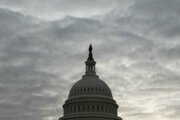CHARLES BABINGTON
Associated Press
PERRY, Ga. (AP) — One Republican highlights the nation’s lackluster recovery since the Great Recession. Less than an hour later, another GOP candidate from the same state gets attacked for it.
Candidates everywhere this midterm election season are struggling for ways to frame the state of the economy, ranked by voters as the most important issue. The result is a blame game that cuts in multiple directions depending on the contest — even, in one case, within the same state.
For example, Georgia Republican Senate nominee David Perdue doesn’t miss a chance to blame President Barack Obama and a Democratic-led Senate for the nation’s slow economic recovery.
“This president sold us a bill of goods,” Perdue told a raucous crowd at the Georgia state fairgrounds during a debate with Democratic nominee Michelle Nunn this week. “We have fewer working today than at any time since Jimmy Carter was president.”
Within moments, the state’s Republican governor, Nathan Deal, stood on the same stage while his Democratic challenger — Carter’s grandson — sharply blamed the governor for Georgia’s 8.1 percent unemployment rate, which in August was the nation’s highest.
“You have watched this economy in Georgia leave the middle class behind,” said Jason Carter, a state senator.
Even in states where rising unemployment might offer tempting targets, many candidates fear unintended consequences and political boomerangs if they delve too deeply into economic debates.
Democrats in Republican-run states worry that an emphasis on economic woes might reflect badly on Obama, and by extension, themselves. But Republicans in those same states often worry that highlighting a shaky economy will reflect badly on the GOP governor and other Republicans.
Perdue took that risk in Georgia, but other Senate candidates are more cautious.
North Carolina is an example. The August unemployment rate was 6.8 percent, up from 6.2 percent in April — a potential opportunity for Sen. Kay Hagan, the Democrat seeking a second term.
She accuses her Republican challenger — state House Speaker Thom Tillis — and GOP Gov. Pat McCrory of spearheading ill-advised tax and spending cuts. Hagan says their cuts to education funding drove away teachers this year and will hurt North Carolina’s job growth in future years.
But Hagan had said little about the higher unemployment rate until she was asked about it in an Oct. 7 debate. She alluded to state legislative actions when she said Tillis’ tax and jobs policies were “sending our teachers to Texas, our film jobs to Georgia and our Medicaid dollars to 28 states.” Over Hagan’s objections, North Carolina’s GOP-controlled government declined a federally funded Medicaid expansion.
Tillis’ approach: “Government kills jobs,” he said. “Small businesses, large businesses create jobs.”
Outside the debate format, Tillis and Hagan tend to emphasize other issues.
“It’s a tough issue for both campaigns because neither one knows who the public will blame,” said Thomas Mills, a Democratic blogger who has worked for statewide campaigns. Hagan has gained traction lately by hitting Tillis on education and tax issues, Mills said, “so I’m not sure she wants to change the subject right now.”
The story is similar in several other states with tight Senate races. Republicans need six more seats to control the chamber.
In many states, Republicans seem content to stick with their longtime favorite issue: attacking the president’s health care overhaul, widely known as “Obamacare.” And several Democrats want to distance themselves from Obama, which complicates any effort to tout an improving economy associated with him.
The national unemployment rate is 5.9 percent, the lowest in six years. But local unemployment rates have ticked up recently in four states with sharply contested Senate races: North Carolina, Louisiana, Alaska and Georgia.
The unemployment rate has fallen in Colorado and Kentucky. It has been flat lately in Iowa, Arkansas and Kansas. All those states have contested Senate races.
Unemployment plays a bigger role in races for governor, a post more directly associated with a state’s economy.
In Wisconsin, Democrat Mary Burke centers her challenge to GOP Gov. Scott Walker on his failed promise to create 250,000 private-sector jobs. Wisconsin has the nation’s 17th-lowest unemployment rate, 5.6 percent.
In Georgia, Carter is trying to deny Deal a second term as governor. Perdue and Nunn are running for the Senate seat being vacated by Republican Saxby Chambliss.
Voters are left to decide who is responsible for the sluggish job growth in a state run by Republicans while the federal government is split between a GOP-run House and a Democratic-led Senate and White House.
Even in states with falling unemployment rates, Senate candidates are reluctant to highlight the news.
Kentuckians watching political TV ads might think their state’s unemployment rate, at 7.1 percent, has risen instead of fallen lately.
Allies of Sen. Mitch McConnell, the Republican seeking a sixth term, have run ads in which a Kentucky coal miner says he lost his job thanks to a “war on coal.” McConnell repeatedly says Obama wages such a war with help from Democratic candidate Alison Lundergan Grimes, even though she sharply criticizes the president’s coal policies.
___
Babington reported from Washington.
Copyright 2014 The Associated Press. All rights reserved. This material may not be published, broadcast, rewritten or redistributed.







